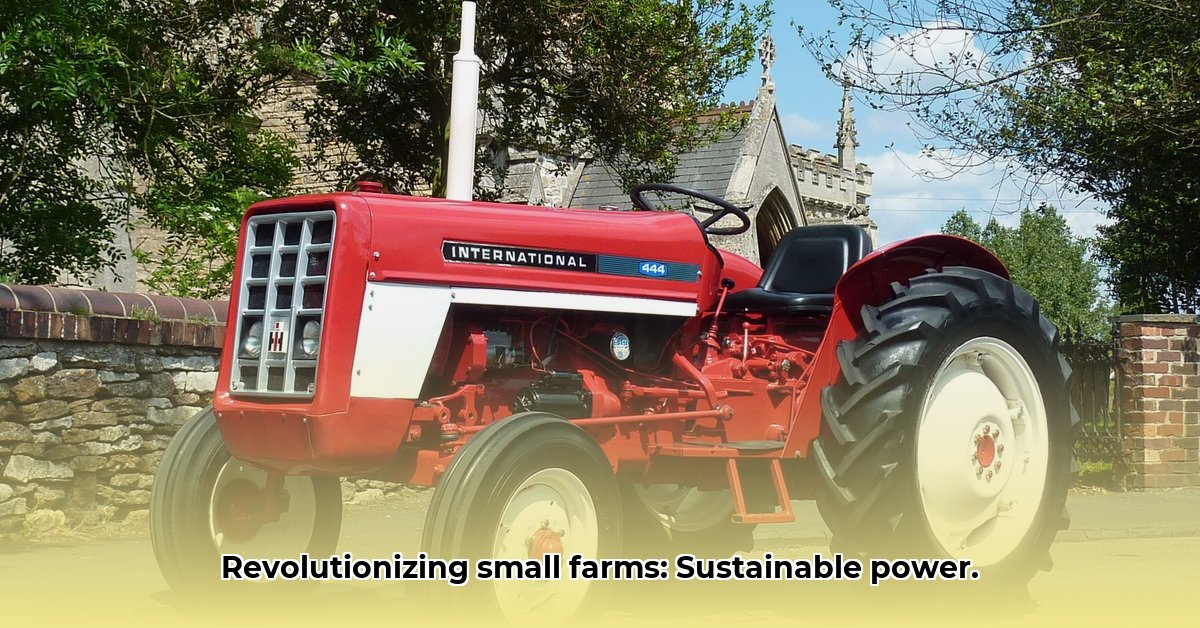
International 444 Tractor: A Sustainable Farming Solution for Small Farms?
The International 444 tractor, a symbol of hardworking farmers from a bygone era, is seeing renewed interest, particularly within the sustainable agriculture movement. But is this vintage machine truly a viable option for today's small farms? Let's explore its potential. For more information on this classic tractor, check out this useful resource.
Simplicity and Fuel Efficiency: A Different Kind of Green
Unlike modern tractors brimming with electronics, the International 444 boasts remarkable simplicity. This straightforward mechanical design translates to potential long-term cost savings. Fewer parts mean fewer potential breakdowns and lower repair bills. While its fuel efficiency doesn't match state-of-the-art diesel tractors, reduced maintenance costs could offset fuel differences over its lifespan. Its resilience to harsh conditions and minimal reliance on delicate electronics offer advantages in rural areas with limited access to repairs. Could this simplicity be a key to sustainable farming?
A Perfect Fit for Smaller Operations
The 444's compact size and maneuverability are ideal for smaller farms. Sustainable agricultural practices often involve smaller-scale operations prioritizing local markets and environmentally friendly processes. The lower initial investment compared to new tractors makes it accessible for farmers with limited budgets. Its ability to navigate tight spaces and work efficiently in smaller fields is a significant advantage. This nimbleness is akin to the agility needed for precision farming techniques.
Reviving a Legacy: Restoring and Reusing the 444
Manufacturing new farm equipment significantly impacts the environment. Restoring and reusing an existing tractor like the International 444 drastically reduces this impact. These durable machines, with proper care, offer years of reliable service. Reusing a 444 reduces the demand for new manufacturing and resource consumption – a significant win for sustainability. This is a practical application of "reduce, reuse, recycle" in agricultural machinery.
Acknowledging the Limitations: A Balanced Perspective
The International 444 isn't a perfect replacement for all modern tractors. Its horsepower is lower than newer models, potentially requiring longer working hours for the same tasks. Fuel consumption, while potentially offset by lower maintenance, is also higher compared to modern, fuel-efficient engines. Finding replacement parts may be challenging, requiring resourcefulness and networking.
The Verdict: A Sustainable Option, But Not a Universal Solution
The International 444 presents a compelling case for sustainable agriculture on smaller farms. Its simplicity, durability, and potential for restoration offer a pathway towards low-impact farming. However, it’s not a universal solution. Farmers must weigh the advantages—lower initial cost, simpler maintenance—against the disadvantages—lower horsepower, higher relative fuel consumption, and potential parts sourcing challenges. The optimal choice depends on the farm's specific needs and resources. Further research into the long-term sustainability of using restored vintage tractors like the International 444 is crucial for a complete understanding of their role in modern sustainable farming systems.
Comparative Table: International 444 Tractor vs. Modern Tractor
| Feature | International 444 Tractor | Modern Tractor |
|---|---|---|
| Initial Cost | Lower | Higher |
| Maintenance | Generally simpler, potentially lower cost | More complex, potentially higher cost |
| Fuel Efficiency | Lower than modern equivalents | Higher |
| Horsepower | Lower | Higher |
| Environmental Impact (Manufacturing) | Potentially lower (if restored/reused) | Higher |
| Adaptability to Small Farms | Excellent | Can be challenging |
Note: This table provides a general comparison. Specific figures vary depending on tractor models and condition.
How to Improve Soil Health for Precision Farming Techniques
Key Takeaways:
- Sustainable farming practices are essential for long-term agricultural viability.
- Soil health directly impacts crop yields and farm profitability.
- Precision farming techniques, combined with improved soil management, significantly boost efficiency and sustainability.
- The International 444 tractor, while older technology, embodies efficient resource use relevant to sustainable practices.
The International Harvester 444 tractor's relevance in sustainable agriculture is undeniable. While not a technologically advanced machine, it highlights principles central to efficient resource utilization and soil health.
The 444's Legacy: Efficiency and Adaptability
Consider the 444 a symbol of efficient resource use. Its relatively low horsepower and compact size were ideal for smaller farms, resulting in less fuel consumption and soil compaction compared to larger tractors. Less compaction leads to better soil aeration and water infiltration—crucial for healthy soil. This aligns with precision farming's goal of minimizing environmental impact while maximizing output.
Precision Farming and Soil Health: A Synergistic Partnership
Improving soil health for precision farming techniques requires integrated approaches:
- Targeted Fertilizer Application: Precision farming enables variable rate fertilizer application based on soil tests and crop needs. This minimizes fertilizer waste and reduces nutrient runoff, protecting water quality and improving soil nutrient balance.
- Optimized Irrigation: Precision irrigation systems, guided by soil moisture sensors, deliver water only where and when needed. This conserves water and prevents waterlogging, which harms soil structure.
- Reduced Tillage: No-till or reduced-till farming minimizes soil disturbance, enhancing soil structure, improving organic matter content, and reducing erosion. The 444's size may have facilitated these techniques due to its maneuverability in sensitive terrains.
- Cover Cropping: Planting cover crops between cash crops protects the soil from erosion, adds organic matter, and improves soil fertility. Precision-guided equipment aids in planting and managing cover crops.
The 444 and Sustainable Practices: A Modern Perspective
The International 444 reminds us that sustainable practices aren't solely about the latest technology. It’s about applying the right tools with mindful techniques. The 444's fuel efficiency, maneuverability, and suitability for small-scale farming remain vital for sustainable agriculture today.
Restoring and Reusing Older Equipment
Restoring and reusing older equipment like the 444 is a sustainable practice. Repurposing existing machinery reduces environmental impact and saves money. Restoring an International 444 might be a pathway to sustainable farming. While sourcing parts and finding skilled mechanics pose challenges, the rewards—reduced environmental impact and lower running costs—align perfectly with the ideals of sustainable agriculture.